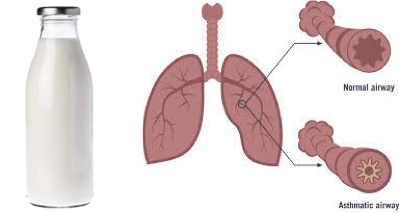Milk and other dairy products are commonly consumed foods that provide essential nutrients such as calcium, protein, and vitamins. However, there is ongoing debate and research regarding their potential impact on asthma, a chronic Milk and other dairy products are commonly consumed foods that provide essential nutrients such as calcium, protein, and vitamins.
However, there is ongoing debate and research regarding their potential impact on asthma, a chronic respiratory condition characterized by inflammation and narrowing of the airways. While some individuals may experience worsened asthma symptoms after consuming dairy products, the relationship between milk and asthma is complex and varies among individuals.
Asthma is a chronic respiratory condition characterized by inflammation and narrowing of the airways, leading to symptoms such as wheezing, shortness of breath, chest tightness, and coughing. These symptoms can vary in severity and frequency, often triggered by factors like allergens, respiratory infections, exercise, or environmental pollutants. Asthma affects people of all ages and can significantly impact daily activities and quality of life.
Role of dairy in asthma
Inflammatory response: Dairy products contain proteins such as casein and whey, which some individuals may be sensitive to. In susceptible individuals, consuming dairy products can trigger an inflammatory response in the body, potentially exacerbating asthma symptoms.
Mucus production: Some people with asthma may experience increased mucus production in the airways after consuming dairy products. This excess mucus can contribute to airway obstruction and worsen breathing difficulties in individuals with asthma.
Studies investigating the relationship between dairy consumption and asthma have yielded mixed results. Some studies have found a positive association between dairy intake and Research suggests that dairy consumption during infancy and childhood may be associated with an increased risk of developing asthma or respiratory symptoms. However, the evidence is not conclusive, and more research is needed to understand the relationship between early dairy exposure and asthma risk.
In adults with existing asthma, the impact of dairy consumption on
Few things to consider
The impact of dairy on asthma symptoms can vary greatly among individuals. Some people may be more sensitive to dairy proteins or lactose intolerance, while others may tolerate dairy products without experiencing adverse effects on their asthma.
Individuals experiencing asthma symptoms that worsen after consuming dairy products may benefit from allergy testing to determine if they have a dairy allergy or intolerance. Identifying specific triggers can help individuals make informed dietary choices to manage their asthma effectively.



























